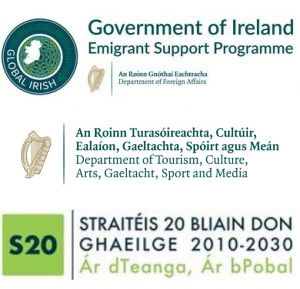
1-4 September 2021
VIDEOS OF EVENTS NOW AVAILABLE (below).
Hosted online by the Centre for Irish Studies, Charles University, Prague.
Conference Committee: Ondřej Pilný, Clare Wallace, Radvan Markus, Daniela Theinová, Justin Quinn, James Little
Keynote Speakers: Lian Bell (Dublin), Louis de Paor (National University of Ireland, Galway), Mary McAuliffe (University College Dublin), Maeve Stone (Dublin), Gavan Titley (Maynooth University)
Participating Artists: Kateřina García and Liam Ó Maonlaí (music), Ailbhe Ní Ghearbhuigh, Ailbhe Darcy and Louis de Paor (poetry), Pat Collins, Alan Gilsenan and Gillian Marsh (documentary film)
Conference Manager: Marie Gemrichová
Student Assistants: Klára Hutková, Nathalie Lamprecht, Katrina Trompak
The conference is part of the European Regional Development Fund project “Creativity and Adaptability as Conditions of the Success of Europe in an Interrelated World” (No. CZ.02.1.01/0.0/0.0/16_019/ 0000734), is supported by the Department of Foreign Affairs, Ireland, and organised in partnership with the Irish Film Institute.
The conference will be opened by H.E. Cliona Manahan, Ambassador of Ireland to the Czech Republic.
The 2021 conference of the European Federation of Associations and Centres of Irish Studies (EFACIS) proposes to approach Ireland as interface, a locus that allows intercultural exchange, rather than as an essentialist concept. It seeks to examine contact zones with other cultures as a site of productive and mutually enriching dialogue which can play a seminal role in de-escalation and prevention of conflict. Such a perspective is inflected not only by increasing globalisation, but also more specifically by recent developments such as the European migrant crisis, climate change, or indeed the COVID-19 pandemic. The conference will focus on the negative phenomena associated with the current challenges as well, particularly the pan-European (or global) resurgence of toxic nationalist discourse, and examine how a de-essentialised concept of culture may assist in combating these. Thus, the arts may be viewed as a particularly important site of dialogue; however, the interpretation of history and the examination of cultural memory formation are at least as vital, as is the examination of the transformations of Irish society, politics, and economics. Lastly, the conference intends to discuss interdisciplinary dialogues in Irish studies, treating the frontiers of disciplines, research areas and methodologies as interfaces that are changing how we understand Ireland past, present, and future.
VIDEO RECORDINGS:
Liam Ó Maonlaí & Kateřina García Live from Marlay House
Poetry Reading: Ailbhe Ní Ghearbhuigh, Louis de Paor, Ailbhe Darcy
Roundtable on Irish Documentary Cinema with Gillian Marsh, Alan Gilsenan, and Pat Collins
Plenary Conversation with Lian Bell and Maeve Stone
Featured Book Launches: Michael D. Higgins, Reclaiming the European Street: Speeches on Europe and the European Union, 2016-20, ed. by Joachim Fischer and Fergal Lenehan; Galina Kiryushina, Einat Adar and Mark Nixon (eds), Samuel Beckett and Technology; Frank Shovlin (ed.), The Letters of John McGahern; Gail McConnell, The Sun is Open; Deirdre Ní Chonghaile, Collecting Music in the Aran Islands: A Century of History and Practice; Daniela Theinová, Limits and Languages in Contemporary Irish Women’s Poetry
